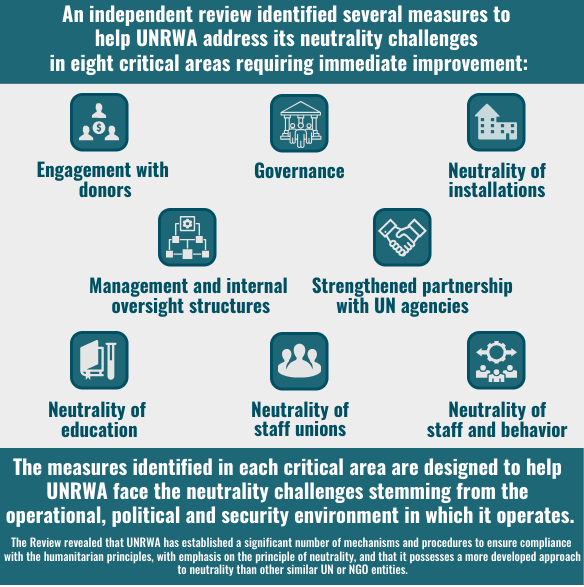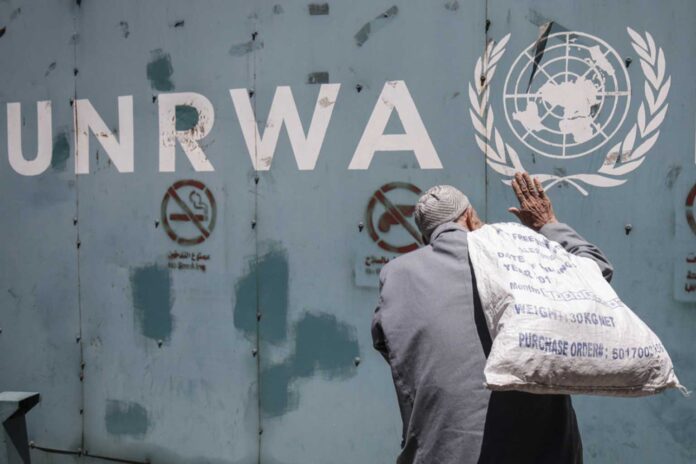The high level independent review panel on UNRWA, the UN Relief Agency for Palestine Refugees, released its much-awaited report on Monday, 22 April, providing 8 major recommendations and 50 total recommendations, to ensure adherence by UNRWA to the humanitarian principle of neutrality.
The final report was released at UNHQ New York by Catherine Colonna, former French Foreign Minister and head of the Independent Panel. While speaking to journalists at UNHQ, she stated “The set of rules and the mechanisms and procedures in place at UNRWA are the most elaborate within the UN system, precisely because it is such a difficult issue to work in such a complex and sensitive environment.” She strongly encouraged “the international community to work side by side with the agency so it can perform its mission and overcome the challenges when they are there.”
In its nine-week-long review of existing mechanisms, the Independent Panel conducted more than 200 interviews, met with Israeli and Palestinian authorities and directly contacted 47 countries and organisations, presenting a set of 50 recommendations on issues ranging from education to fresh vetting processes for recruiting staff.
The UN Secretary-General, António Guterres who received and accepted the report on Monday, had appointed the independent review panel days after Israel had made shocking allegations against UNRWA in January 2024, accusing the UN agency, which employees 30,000 people and serves 5.9 million Palestine refugees in the West Bank, Jordan, Lebanon, Syria and war-torn Gaza, of direct involvement of 12 staff members in the 07 October terror attacks on Israel.
It is to be noted that Colonna, the Head of the Independent Review Panel has stressed that her mandate was to review UNRWA’s neutrality — not to investigate the serious Israeli allegations. A separate formal investigation into those is underway by the U.N. internal watchdog, the Office of Internal Oversight Services, known as OIOS.
This is the first of 2 Investigations
Following Israel’s allegations against UNRWA, the UN agency had immediately fired the staff members in question and requested a swift, impartial investigation into the matter. The UN Secretary-General had ordered two investigations.
One was the Independent Review Panel led by Ms. Colonna and researched by Raoul Wallenberg Institute in Sweden, the Michelsen Institute in Norway and the Danish Institute for Human Rights, to investigate the UNRWA’s process of ensuring neutrality in its work.
The other was by the UN’s internal watchdog, OIOS to investigate the veracity of Israel’s claims against the 12 UNRWA staff members. This investigation is still ongoing.
Thus speaking to journalists, Colonna made clear that her work “is a separate mission. And [investigating Israel’s 7 Oct allegations against UNRWA] is not in our mandate”. She also said “it is not surprising that Israel [has] not provided evidence of its allegations to UNRWA, because it doesn’t owe this evidence during the investigation to UNRWA but to the OIOS” as per the process.
Israel’s allegations led to the suspension of contributions to UNRWA by the United States and more than a dozen other countries. That amounted to a pause in funding worth about $450 million, according to the review panel’s report, but a number of countries have already resumed contributions.
The report steers new UN action plan
The report’s recommendations include creating a centralised “neutrality investigations unit”, rolling out an updated Code of Ethics and associated training to all staff, and identifying and implementing additional ways to screen UNRWA applicants at an early stage of the recruitment process.
The report also suggested exploring the possibility of third-party monitoring for sensitive projects and establishing a framework with interested donors to ensure transparency.
The UN Secretary-General has agreed with UNRWA Commissioner General Philippe Lazzarini that such an action plan will be established to implement the recommendations contained in the report.
The Panel’s Findings:

On UNRWA schools and installations
The Report notes that UNRWA has an obligation to ensure neutrality of its 1,000 installations, including schools, healthcare centres and warehouses, stating that UNRWA “has consistently worked on ensuring neutrality in education” as it provides elementary and preparatory education for 500,000 pupils in 706 schools with 20,000 educational staff, including in Gaza, where right now all children are out of school following attacks destroying the education system amid the ongoing conflict.
The Report mentions instances where UNRWA’s installations have been misused for political or military purposes by various groups. This undermines the neutrality of the installation and should not happen. The report recommends preventive measures such as more inspections, monitoring and creating deeper community awareness on the civilian nature of the installations.
On UNRWA’s Governance and Management Mechanisms
The report found that UNRWA has a unique governance mechanism, where-in they do not have an Executive Board. They have an ‘Advisory Commission’ and the advisory commission provides ‘advice’. It stated that UNRWA needs to develop stronger governance structures which will benefit its leadership and the agency. Further the Report recommends the ‘Advisory Commission’ needs to meet more regularly at a higher level and have neutrality on its standing agenda, as well as create a working group on neutrality.
The Report also found a clear need to have more senior international staff at UNRWA in its different field positions. This is a critical gap in the organisation currently as less than 1% of UNRWA staff are international.
On Neutrality of UNRWA’s Staff
The report finds that UNRWA faces major challenges due to politicisation of its staff, at least some of them, which is affecting the agency’s neutrality. The report states it is “crucial to form prevention strategies and monitoring strategies and the staff must better respect staff regulations and rules.” UNRWA also needs to give strict and appropriate response to potential breaches, if and when they happen.
UNRWA also needs to regularly share details of its employees in the form of digitalised lists with host countries and Israel, noting that the information sharing could have been better. In turn the host countries and Israel will need to provide screening results and evidence if there is any ‘red flag’ pertaining to any UNRWA employee.
The report has found violations by UNRWA staff unions and recommended actions for them to adhere to the principles of neutrality. In an eye opening example, the report mentions how UNRWA has a 50%-50% employee gender ratio, with both men and women employees working for organisation, but when you go into the top level leadership at UNRWA there is only 1 women in that position alongside 18 men. It also mentions that the agency needs to vet and re-vet staff as they are promoted and put in place a whistle-blower mechanism.
On UNRWA’s Education and Textbooks
The report notes that UNRWA is indispensable to the education of several hundreds of thousands of children in the region. However some UNRWA schools have been utilised to spread political views, violating neutrality principles, not respecting UN values and not respecting UNESCO standards.
Some marginal content inciting hate and violence has been found in the textbooks. Stressing on this, the Head of the independent panel highlighted examples like “textbooks containing current maps of the region, where Israel is not shown at all [its existence is removed], maths problems that ask students to do calculations based on how many ‘zionists’ they have been killed, glorification of jihad, incitement to violence etc.
The report recommends a zero tolerance policy on this issue.
UNRWA remains a pivotal ‘lifeline’ for Palestine
The report has stressed the critical importance of UNRWA, calling the UN agency “irreplaceable and indispensable to Palestinians’ human and economic development” in the absence of a political solution to the Israeli-Palestinian conflict and “pivotal in providing life-saving humanitarian aid and essential social services, particularly in health and education, to Palestinian refugees in Gaza, Jordan, Lebanon, Syria and the West Bank.”
Israel’s Foreign Ministry spokesperson Oren Marmorstein reacting to the report has said “the Colonna report ignores the severity of the problem, and offers cosmetic solutions that do not deal with the enormous scope of Hamas’ infiltration of UNRWA. This is not what a genuine and thorough review looks like. This is what an effort to avoid the problem and not address it head on looks like.”
In response Colonna has urged the Israeli government not to discount the independent review, saying “Of course you will find it is insufficient, but please take it on board. Whatever we recommend, if implemented, will bring good,” she said.
(with inputs from UN News)










